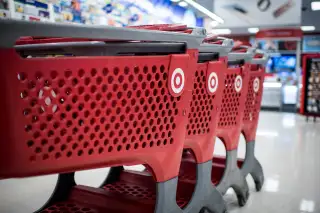5 Reasons Why Fewer People Are Shopping at Target

If you've been shopping less at Target lately, you're not alone. Foot traffic in stores is down 2.2%. Comparable store sales fell 1.1% during the May-July period, the first time in two years there's been a decline during these months.
And Target is now saying that it anticipates further strife in the months ahead: The company is projecting that sales will dip as much as 2% during the third and fourth quarters of 2016—which include the key back-to-school and holiday shopping seasons—after previously forecasting growth between 1.5% and 2.5%.
This is all according to the earnings report released by Target on Wednesday for the second quarter of 2016, ending July 30. Understandably, shares of Target stock have been taking a beating as a result, down around 5% early on Wednesday. Why are shoppers turning away from Target? Here are some reasons:
Groceries. As we reported earlier this week, Target has struggled mightily with its decade-long push to become a go-to grocery destination for shoppers. Target sits "in the middle of no man's land" among grocery competitors, Target COO John Mulligan has admitted, because it lacks the quality and selection of Whole Foods and has higher prices than Walmart and Aldi.
One of the reasons stores like Target have grocery sections in the first place is to boost foot traffic, as shoppers tend to need groceries more regularly than clothing or electronics. The idea is that shoppers are more likely to make other, non-planned purchases during grocery runs. But if consumers do their regular grocery shopping elsewhere—and by most accounts, that's what they do—then Target misses out on all the peripheral and impulse buys shoppers theoretically would have made had they been in the store to pick up milk, eggs, and such.
Read Next: 21 Incredibly Disturbing Facts About High Prescription Drug Prices
Target's failure to attract a broad swath of grocery shoppers, you see, has a negative trickle-down effect on sales in aisles throughout the store.
Prescription Medications. As the (Minneapolis) Star Tribune reported, one of the reasons cited by Target CEO Brian Cornell for the company's 2.2% decline in foot traffic was the transition of its pharmacy operations to CVS.
Consumer advocates worried that Target's decision to let CVS run its pharmacy operations and in-store clinics would hurt competition in the marketplace and perhaps result in higher drug prices for consumers. While it's unclear if there's been any across-the-board impact on prescription pricing during months of transitioning to CVS, Target said the change has led to some disruptions in sales.
As with groceries, many consumers need prescriptions on a regular basis. So if these shoppers are not going to Target to pick up their meds, Target is also missing out on all the potential trickle-down sales as well.
Apple. During Wednesday's conference call, Cornell called out poor sales of electronics—and Apple in particular—as another reason for the company's underwhelming performance. Apple sales were down 20% in the quarter at Target.
Part of the reason for declining Apple sales at Target is that Apple sales in general haven't been as strong as they have in previous years. But clearly, another reason is that shoppers have found other outlets other than Target for picking up their Apple devices.
Fashion. It's been a long time since people referred to Target as "Tarjhay." During the first decade of the millennium, Target enjoyed a reputation as a hot cheap chic destination thanks to frequent partnerships with fashion lines like Isaac Mizrahi and Missoni. With each launch of such goods, Target could expect sales crazes with huge lines and the kind of in-store excitement that Walmart could never dream of.
Read Next: 10 Things Millennials Buy Far More Often Than Everyone Else
Not all the partnerships worked out well, though. The Target-Neiman Marcus collection was a disaster. More recently, Target introduced a collaboration with the Finnish designer Marimekko in the spring of 2016. The response from shoppers was fairly tepid, but not anywhere near the over-the-top successes of past fashion partnerships, including one with Lilly Pulitzer a year ago.
Overall, Target says sales of its "signature categories" (including stylish apparel) "outpaced the total business by 3 percentage points" in the second quarter of 2016, according to CNBC. But no one can honestly say that the Target fashions of today are the draw that they were five or ten years ago.
Amazon. It's not just Target that's been having trouble with apparel sales. Macy's, Sears, J.C. Penney, Gap, American Eagle, and others have been experience huge sales declines—and huge store closures as a result.
One of the reasons people aren't shopping at these stores is that they're turning to cheaper "fast fashion" retailers like H&M and Primark. Another is that they're more likely nowadays to shop online for clothes—specifically at Amazon. Amazon has quietly but massively been expanding its apparel options, and as with nearly every other shopping category under the sun, the world's largest retailer is rapidly stealing clothing sales from the competition.
Read Next: Why Home Depot Is Immune to the ‘Amazon Effect’
Target's online sales were up 16% during the most recent quarter. That may sound pretty good, but it's poor compared to the increase in the first quarter of 2016 (23%) and the second quarter of 2015 (30%). What's more, analysts say that Target's e-commerce operations, which got off the ground more slowly than most of the field, are still far behind the competition. So the only result that would be viewed as positive is if Target's digital sales increases were blowing away everyone at this point.
"Target being in line is not good enough," JP Morgan analyst Chris Horvers said on CNBC, discussing how Target's online sales growth has basically just been keeping pace with competitors of late. "They're playing catch up so they should be outperforming the market at this point."